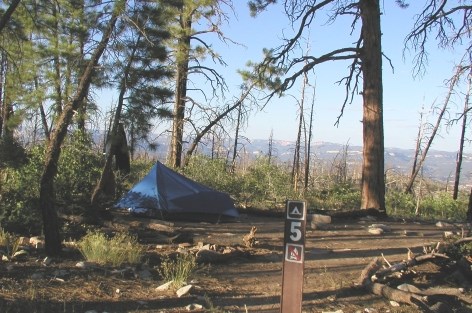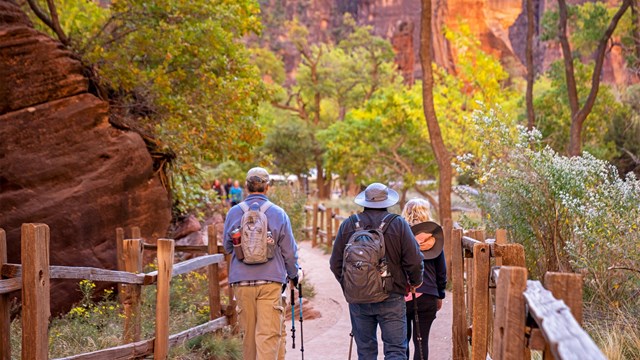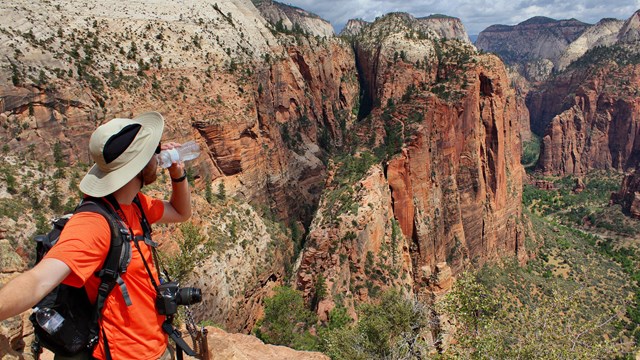
NPS Photo Leave No Trace is a national program that protects the outdoors by inspiring people to enjoy public land responsibly. The seven principles of Leave No Trace promote positive outdoor recreation through education, research, and partnerships. This program is dedicated to building awareness, appreciation, and respect for our public lands. Read each principle below, and follow the tips to help protect Zion National Park during your visit. Take the Zion Pledge to show your dedication to protecting natural and cultural resources! Seven Principles of Leave No TraceZion National Park is protected as a sanctuary of natural and cultural resources. Steep cliffs, narrow canyons, and unpredictable weather add to the challenge and adventure of a visit. It is important to plan carefully and be familiar with the information and regulations listed in the park newspaper and Wilderness Guide.
Please stay on established trails to protect vegetation and fragile cryptobiotic soils. Hiking off-trail can lead to soil compaction, erosion, and unsightly scars on the landscape. Staying on the trail is also important for safety: Many of our trails are near long drop-offs. People have been seriously injured or killed by falling from cliffs in the park.
Pack it in, pack it out. Carry out all trash including food wrappers, apple cores, fruit peels, nut shells, and toilet paper. Dispose of all waste in a proper trash can or dumpster - please recycle when possible. Use the restroom before hiking. Be prepared to pack out human waste, toilet paper, diapers, and hygiene products. Human waste disposal bags are highly recommended to transport solid waste. All human waste must be carried out of the Virgin River Narrows in waste disposal bags. Million of visitors come to Zion Canyon each year, with over 60,000 people receiving permits to visit the Zion Wilderness. Please show respect for your National Park, fellow visitors, and future generations by leaving rocks, plants, and other natural or cultural objects as you find them. Take photos of things that you find interesting, then leave those things for others to discover and enjoy. Protect the canyon walls, trees, and rocks from graffiti and vandalism. Do not build or destroy rock cairns that are used to mark trails and routes. If placed incorrectly, they can mislead visitors, cause unnecessary damage, and lead to potential injuries. Leave the park in a natural state for others to enjoy. When fire danger is high, all campfires may be prohibited. When permitted, fires are only allowed in established fire rings in the campgrounds. Collecting any type of wood in the park is prohibited. Pack out any campfire litter. Trash should never be burned in a campfire, especially plastic items and foil-lined wrappers. Zion National Park is home to many wild animals. Commonly seen animals include mule deer, squirrels, lizards, and many species of birds. Please keep all animals wild and healthy by viewing them from a safe distance. Do not feed or touch wildlife. Store food and trash responsibly.
Like you, many other people are here to explore and enjoy Zion National Park. Respect other visitors and help protect the quality of their experience:
Visit our keyboard shortcuts docs for details
Rangers and Volunteers in Zion have been spending hours cleaning unnecessary vandalism in the park such as rock carvings and scratches, stickers, permanent markers, and in this case, spray paint. Vandalism like this not only greatly impacts the visitor experience in the park, but it is also extremely difficult to remove. This piece covered 150 square feet and took a total of 35 hours of work. Remember to always Leave No Trace! 
Wilderness Regulations
Help keep Zion's backcountry beautiful. Follow the rules and regulations of wilderness areas. 
Things to Do
Find out what there is to do in Zion, from hiking to stargazing. 
Your Safety
Your safety is your responsibility. |
Last updated: January 27, 2026
